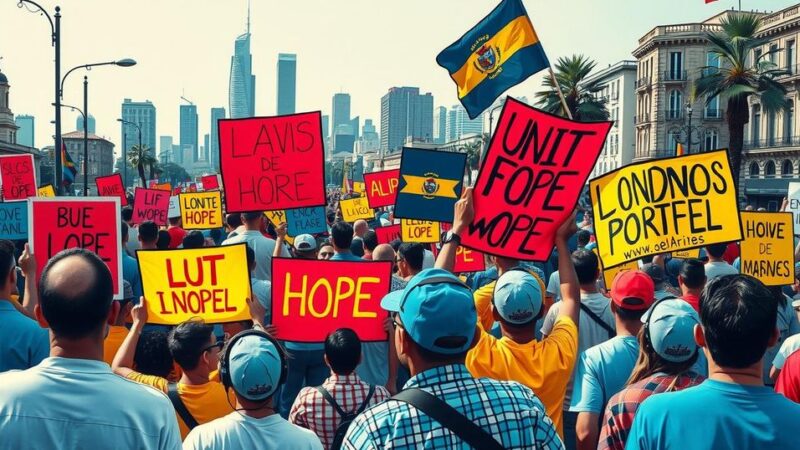Ecuador’s presidential elections on February 9 feature incumbent Daniel Noboa and challenger Luisa González. Both candidates pay little attention to environmental issues, focusing instead on security and the economy. Noboa and González propose some policies favoring environmental protection, essentially conflicting with their plans to attract foreign investments in mining and oil, threatening Ecuador’s ecosystems. The candidates’ approaches to these vital issues will significantly impact Ecuador’s environmental direction in the coming years.
As Ecuador prepares for its presidential elections on February 9, incumbent Daniel Noboa confronts left-wing contender Luisa González. Both candidates emphasize security and economic issues, overshadowing environmental challenges like climate change, deforestation, and water scarcity. Despite this, each has proposed policies aimed at enhancing protections for forests and Indigenous communities while seeking foreign investment in the mining and oil sectors, which pose risks to the environment.
Historically, Noboa, the son of a banana tycoon, ascended to presidency amidst a political crisis marked by corruption scandals. At just 35 years old, he has faced criticisms for his aggressive law enforcement tactics and alleged human rights violations amid rising national issues, including violence and energy shortages. Currently, he is favored to win the upcoming election.
The focus of both candidates remains predominantly on crime and economic recovery, leaving environmental policies in a secondary position concerning their governance. Noboa’s plan for 2025-2029 includes sustainable development initiatives, greenhouse gas emissions reduction, and improving community resilience to climate impacts, alongside a significant investment in the oil and gas industry.
Ecuador is grappling with the implications of climate change, evident through severe droughts that jeopardized hydroelectric power supply. These climate challenges led to extensive blackouts, hampering economic activity and prompting Noboa’s administration to consider rainwater storage solutions. Critics argue that economic priorities overshadow genuine climate concerns, particularly following the failed oil drilling referendum that sought to exploit Indigenous territories.
Indigenous leaders have expressed discontent over mining and drilling expansions on their lands. Noboa touts his commitment to combatting pollution while including marginalized groups in discussions, but activists express skepticism due to increasing violence against them. Calls for Noboa’s resignation have arisen amid these issues, yet he remains slightly ahead of González in polling metrics.
González runs under the banner of the Citizen Revolution Movement, affiliated with former president Rafael Correa. She has been more vocal on climate change than Noboa, aiming to accelerate a shift to cleaner energy and guarantee Indigenous rights, yet she acknowledges the necessity of oil and gas in economic development.
Her campaign plans involve enhancing the existing climate change adaptation framework, with particular attention to forest management and biodiversity conservation. Additionally, González proposes revitalizing governmental agencies that oversee environmental protections, which suffered personnel cuts in recent years. To secure her candidacy outright, she must either achieve a majority or exceed 40% of the vote.
If neither candidate reaches these benchmarks, a runoff will take place in April, similar to the previous election scenario. Given the intense political landscape, the outcome may ultimately rely on a second voting round to determine Ecuador’s future leadership dynamics.
Ecuador is at a pivotal political moment as it approaches its presidential elections. The nation’s history with environmental policies is complex, often sidelined by pressing issues such as crime and economic stability. Both leading candidates, Noboa and González, must navigate this intricate backdrop, balancing the need for economic growth with the urgency of environmental conservation. This election is critical, as decision-making could significantly impact Ecuadorian ecosystems and Indigenous rights. The political environment has been tumultuous, influenced by scandals and social unrest, setting the stage for a new leadership that must address historical grievances, particularly from Indigenous communities facing exploitation of their lands. The candidates’ differing approaches to energy policy and environmental stewardship will play a decisive role in shaping Ecuador’s ecological future. Public sentiment is heavily influenced by recent climate impacts, reflected in the electorate’s demand for accountability and sustainable practices from their leaders. The outcomes of this election could potentially redefine national policies concerning green energy, resource extraction, and Indigenous rights in a nation rich with biological diversity.
In conclusion, the upcoming elections in Ecuador represent a crucial juncture for both the environment and national governance. With both candidates placing primary emphasis on security and the economy, substantial questions remain regarding their commitment to environmental conservation amidst exploitation concerns. The policies proposed by Noboa and González could determine Ecuador’s ecological trajectory over the next four years, especially concerning Indigenous rights and climate change adaptation. Ultimately, the election’s outcome will be essential for defining the nation’s environmental priorities moving forward.
Original Source: news.mongabay.com






